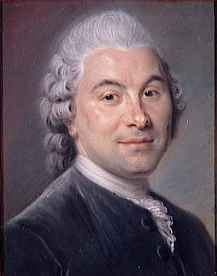| Profile | Major Works | Resources |
François Véron Duverger de Forbonnais, 1722-1800.

Highly talented and influential French Neo-Colbertiste economist.
Born François Véron du Verger in Le Mans to a manufacturing family, Forbonnais was educated at a Jansenist school in Paris. After leaving school, Forbonnais spent several years traveling across Spain and Italy on his father's business. In 1743, he began working for his uncle in the bustling port of Nantes. Forbonnais acquired his economics education from reading the English Mercantilists and French thinkers like Vauban, but his main ideas were gathered from his practical experiences and careful observations of commercial life.
Veron de Forbonnais launched into print in 1750 with commentary on the economic sections of Montesquieu's L'Esprit des lois. It was not a success. Forbonnais moved to Paris in 1752, where he submitted several schemes for reforming public finances to the government. In 1753 he translated two Mercantilist classics -- one by the Spanish mercantilist thinker Geronymo de Uztariz and another by the Englishman Charles King.
Attracting the attention of fellow Enlightenment thinkers, Forbonnais soon became part of the Parisian "republic of letters". Between 1753 and 1755, Forbonnais contributed several articles to the famous Encyclopédie of Denis Diderot and Jean Le Rond d'Alembert (e.g. "Colonies", "Commerce", "Concurrence", "Change", "Especes" etc.). However, it seems Forbonnais services were dispensed with in later volumes (when the Physiocrats entered the project). But Forbonnais had moved on by then.
Forbonnais expanded on some of his articles to produce his 1754 Éléments. It was here that Forbonnais apparently developed an early version of Keynes's liquidity preference theory of money, arguing that interest is the "tribute" paid to money-hoarders to part with their cash. In 1758, Forbonnais published his massive Recherches, an analytical history of French public finances. The care and research he put in this work was unprecedented and unparalleled. (great chunks of it were used by the editor Rousselot de Surgy for the article in the finance volumes of the Encyclopédie Méthodique 1784-87) The 1758 Recherches, together with his 1756 Considérations, remain enormously useful sources even today.
Forbonnais quickly became the leading economist in France. He was appointed inspecteur général des monnaies in 1756 and then, in 1759, became the economic advisor to the contrôleur-général Silhouette and the Duke of Choiseul. The ambitious reforms undertaken by this ministry, perhaps the first with the public welfare in mind, were primarily due to Forbonnais. In 1763, he was ennobled by the Parlement of Metz and only now acquired the appellation "de Fortbonnais" (he became known thereafter as Véron de Forbonnais).
However, Forbonnais's star soon fell. A fiercely independent administrator and poor politician, Forbonnais made few friends and numerous enemies in the corridors of power. The Physiocrats, by now, had begun publishing and considered his Neo-Colbertiste doctrines their primary target. A series of intrigues were hatched against him, several of them instigated by the powerful Madame de Pompadour, the king's mistress and the Physiocrats' benefactress.
In 1763, Forbonnais unveiled his famous plan for a uniform ad valorem 15% import duty with no exemptions. Even though it undermined the privileged classes, it was approved by Choiseul and the Parlement of Paris. However, Madame de Pompadour was incensed -- not only by the reforms, but also by the fact that she had not been consulted. She had Louis XV exile Forbonnais to his estate in Champaissant in 1764. It was rescinded six weeks later, but, wary of stepping back into a nest of vipers, Forbonnais decided to stay put and focus on his lands.
Forbonnais returned to Paris in 1766, searching for a colonial post. He ended up succeeding Dupont de Nemours in the editorship of the Journal de l'agriculture, du commerce et des finance. He quickly turned it around, from a Physiocratic rag to a bastion of Neo-Colbertism. In 1767, he published his Principes, collecting his critical examinations of Physiocratic doctrine and putting forth perhaps his best statement of the Neo-Colbertiste position. He attacked the Physiocrats again in his 1768 review of Abeille's tract.
In many ways, Forbonnais was fighting a rearguard action. Although he was no friend of the privileged classes and tried to add many liberal features to Mercantilist doctrines, it was clear that their days were numbered. He remained convinced that Britain's power and wealth was due to (and not in spite of) its protectionist policies, and continued to recommend them for France. His work was extremely influential on German Neo-Cameralists like Sonnenfels. His criticisms of the Physiocrats focused on their land-obsessive produit net (Forbonnais believed that industry and commerce were also sources of wealth). Naturally, for such a practical and empirically-minded man, he deplored the Physiocrats' leaps of abstraction and what he perceived as a utopian vision of how the economy worked.
As the Physiocrats fell from favor after 1769, Forbonnais rested his pen, preferring to concentrate on the affairs of his estates. He re-emerged during the 1789 Revolution. Although he failed to be elected to the Estates-General in 1789, Forbonnais was called to Paris in 1790 by the finance committee of the Constituent Assembly. He focused his attention on monetary questions and published a tract on the assignats (oddly, one of his few signed works). After failing once again to be elected in 1791, Forbonnais returned to a quiet life back on his estate.
In 1794, Forbonnais was elected to the Institut de France, the new academy of sciences founded by the republicans. He contributed a handful of articles under the name "Viellard de la Sarthre", to the Historien, a journal founded by Dupont de Nemours in 1796. In 1799, turmoil in his region forced him to take refuge in Paris, where he died soon afterwards.
|
Major Works of François Véron de Forbonnais
|
|
Resources on Veron de Forbonnais
|
All rights reserved, Gonçalo L. Fonseca
